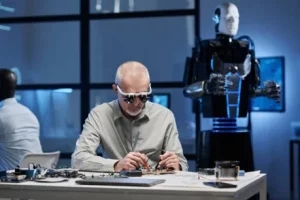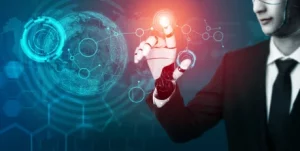Transforming Digital Marketing with Generative AI: A Game-Changer in 2025
Introduction: When Creativity Meets Intelligence
Imagine launching a full marketing campaign in hours—not days. Writing ad copy, blog posts, personalized emails, and social media content—automatically. That’s not a dream anymore. In 2025, Generative AI is reshaping how marketers work, think, and create. Far from replacing human creativity, AI amplifies it. It accelerates production, boosts personalization, and gives marketers more time to focus on strategy and storytelling.
Let’s explore how this revolution is changing the rules of digital marketing—forever.
What Is Generative AI in Marketing?

Generative AI refers to AI systems capable of producing original content—text, images, audio, video, or even code—based on data inputs. In marketing, it powers tools like ChatGPT, Jasper, Copy.ai, and Canva Magic Write to deliver content faster and smarter than ever before.
Examples of What Generative AI Can Do for Marketers
- Write SEO-optimized blog posts
- Create personalized product descriptions
- Generate ad headlines for different audiences
- Design branded visuals and social media graphics
- Draft customer emails based on behavior data
Why Generative AI Matters in 2025

1. Speed and Scalability
With AI, marketers can scale content production across multiple platforms—automatically. You no longer need to start from scratch for every campaign. Generative AI tools can create dozens of variations in minutes, freeing up time for creative direction and testing,
2. Hyper-Personalization
Marketing isn’t one-size-fits-all anymore. Generative AI allows brands to generate personalized messages, images, and recommendations for each user based on behavior, interests, and demographics—dramatically improving engagement and conversion rates,
3. Data-Driven Creativity
AI doesn’t just create—it learns. It analyzes performance data in real-time and suggests better headlines, keywords, or visuals. This creates a powerful loop between creation and optimization, where your campaigns get smarter over time.
Real-World Use Cases: Generative AI in Action

- Coca-Cola launched a generative AI campaign combining human artistry with AI-generated visuals in their “Masterpiece” ad, sparking global conversations.
- HubSpot integrated generative tools for blogs and landing pages, helping small businesses create quality content without hiring full writing teams.
- Sephora uses AI-powered virtual assistants to generate personalized beauty tips and product suggestions via chat, increasing customer loyalty.
The Best Generative AI Tools for Digital Marketers in 2025
Here’s a curated list of tools making waves this year:
- Jasper – advanced content generation for blogs, ads, and emails
- Copy.ai – write punchy ad copy, social posts, and website text
- Canva Magic Write – design + text generation in one platform
- Writesonic – generate full marketing funnels with AI
- ChatGPT – conversational content and brainstorming support
Challenges and Ethical Considerations

1. Content Authenticity
AI-generated content can sound generic or even incorrect. Marketers must carefully review and humanize output to maintain brand voice and trust.
2. Plagiarism and Copyright
Some generative models may inadvertently echo content from their training data. Always use plagiarism detectors and edit the content to ensure originality.
3. Over-Automation Risks
AI is powerful, but creativity and empathy remain human strengths. Over-automating marketing can make campaigns feel cold or disconnected if not supervised properly.
Best Practices for Using Generative AI in Marketing
- Use AI for ideation, first drafts, or A/B testing—then refine with human input.
- Keep your brand tone consistent by training AI tools on your own style guide.
- Combine AI insights with real customer feedback for stronger messaging.
- Always disclose when AI is used in customer-facing content (when relevant).
Conclusion: Generative AI Is the Marketer’s New Superpower
In 2025, marketers who embrace generative AI don’t just save time—they gain a competitive edge. The future of content isn’t about machines replacing creatives—it’s about machines empowering creatives to think bigger, work faster, and connect deeper. As long as we keep humans in the loop, generative AI will be a force for smarter, more meaningful marketing.
Are you ready to rethink how your brand creates and communicates?
